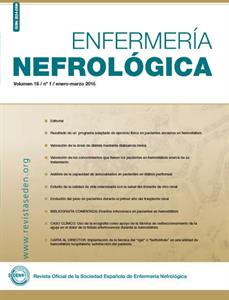Contenido del artículo principal
Resumen
Introducción: El incremento de pacientes con enfermedad renal crónica que necesitan de terapias sustitutivas de la función renal es un hecho en nuestro entorno sanitario. La hemodiálisis es uno de los tratamientos sustitutivos de elección para estos pacientes.
Los pacientes presentan con frecuencia dudas y comportamientos que sugieren un déficit de conocimientos sobre la hemodiálisis y los aspectos que la rodean tales como el olvido de la medicación y el desconocimiento de las normas dietéticas entre otros. La falta de dichos conocimientos puede conllevar a la no adherencia del tratamiento lo que constituye un problema sanitario de primer orden.
El objetivo de nuestro trabajo fue analizar el grado de información y conocimientos que tienen los pacientes en programa de hemodiálisis respecto a la propia técnica, a la dieta, a la medicación que deben tomar y al acceso vascular.
Material y métodos: Se realizó un estudio transversal en el que, mediante una encuesta, estudiamos el grado de conocimiento acerca del programa de hemodiálisis y del tratamiento que llevaban a cabo los pacientes con enfermedad renal crónica que recibían hemodiálisis en el Hospital Fundación Jiménez Díaz.
Se evaluaron 32 pacientes, para el análisis estadístico se utilizó la media y desviación típica para las variables cuantitativas y las tablas de contingencia para las variables cualitativas. Para el contraste de hipótesis se empleó el test de la Chi-cuadrado.
Resultados: La media de aciertos fue 14,44±2,75, de un total de 18 preguntas.
Nuestros pacientes, en general, tienen medios/altos conocimientos, dependientes de edad, ocupación y si cocinan sus propios alimentos.
Conclusiones: en consonancia con otros estudios consideramos que es necesario mantener una educación continua a lo largo del tratamiento con evaluaciones periódicas que nos reporten el nivel de conocimientos a lo largo del tiempo.
Los pacientes presentan con frecuencia dudas y comportamientos que sugieren un déficit de conocimientos sobre la hemodiálisis y los aspectos que la rodean tales como el olvido de la medicación y el desconocimiento de las normas dietéticas entre otros. La falta de dichos conocimientos puede conllevar a la no adherencia del tratamiento lo que constituye un problema sanitario de primer orden.
El objetivo de nuestro trabajo fue analizar el grado de información y conocimientos que tienen los pacientes en programa de hemodiálisis respecto a la propia técnica, a la dieta, a la medicación que deben tomar y al acceso vascular.
Material y métodos: Se realizó un estudio transversal en el que, mediante una encuesta, estudiamos el grado de conocimiento acerca del programa de hemodiálisis y del tratamiento que llevaban a cabo los pacientes con enfermedad renal crónica que recibían hemodiálisis en el Hospital Fundación Jiménez Díaz.
Se evaluaron 32 pacientes, para el análisis estadístico se utilizó la media y desviación típica para las variables cuantitativas y las tablas de contingencia para las variables cualitativas. Para el contraste de hipótesis se empleó el test de la Chi-cuadrado.
Resultados: La media de aciertos fue 14,44±2,75, de un total de 18 preguntas.
Nuestros pacientes, en general, tienen medios/altos conocimientos, dependientes de edad, ocupación y si cocinan sus propios alimentos.
Conclusiones: en consonancia con otros estudios consideramos que es necesario mantener una educación continua a lo largo del tratamiento con evaluaciones periódicas que nos reporten el nivel de conocimientos a lo largo del tiempo.
Palabras clave
hemodiálisis; tratamiento farmacológico; dieta; acceso vascular; grado de conocimiento; enfermedad renal crónica.
Detalles del artículo
Licencia
Aviso de derechos de autor/a
© Los autores ceden de forma no exclusiva los derechos de explotación de los trabajos publicados y consiente en que su uso y distribución se realice con la Licencia Creative Commons Atribución - No comercial 4.0 Internacional (CC BY-NC 4.0). Puede consultar desde aquí la versión informativa y el texto legal de la licencia. Esta circunstancia ha de hacerse constar expresamente de esta forma cuando sea necesario.
Cómo citar
1.
Sánchez González JC, Martínez Martínez C, Pablos López M, Bethencourt Fernández D. Valoración de los conocimientos que tienen los pacientes en hemodiálisis acerca de su tratamiento. Enferm Nefrol [Internet]. 2015 [consultado 8 Nov 2025];18(1):[aprox. 8 p.]. Disponible en: https://www.enfermerianefrologica.com/revista/article/view/4034




